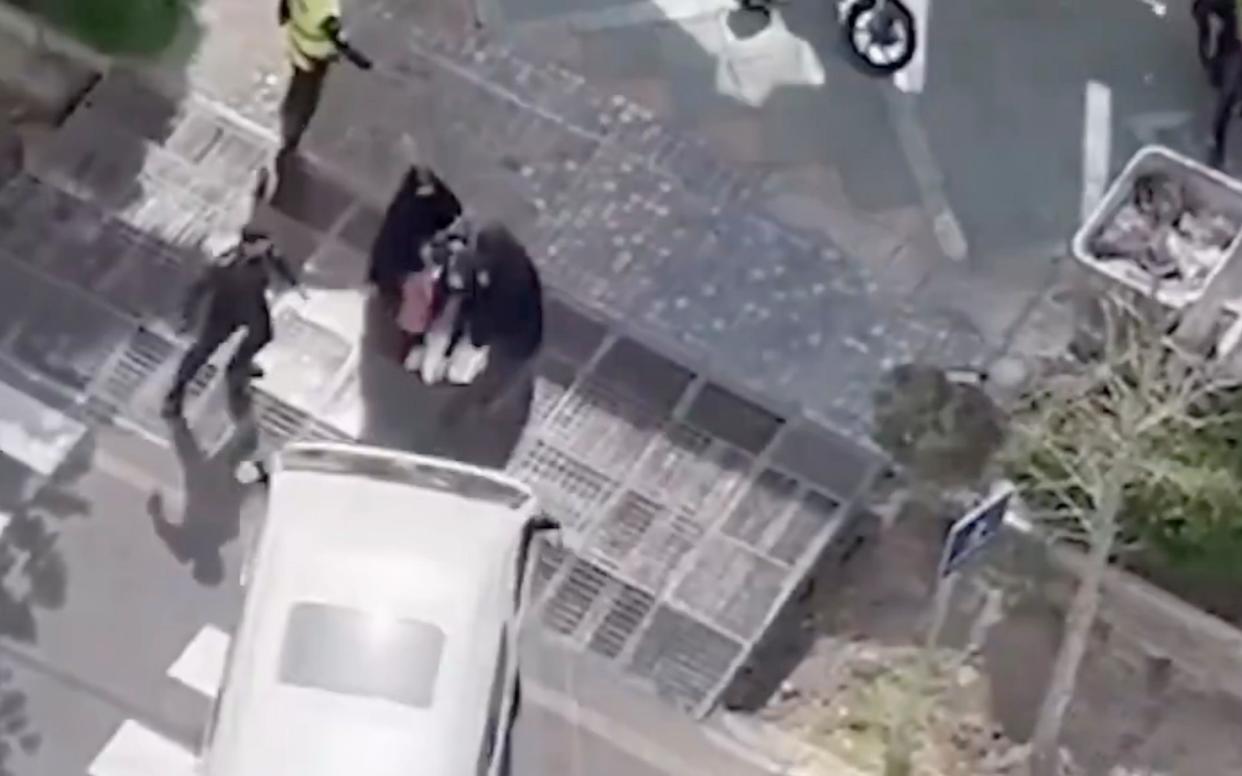Iranian women are betraying others to morality police for wearing fitted trousers

A hard-line Iranian militia is hiring women to enforce the country’s strict hijab rules, using them to spy on other women and bundle offenders into vans to be taken for interrogation.
Dressed in black from head to toe, thousands of female “hijab enforcers” have swarmed the streets of Iranian cities over the past three weeks, patrolling supermarkets, metro stations, cafes, restaurants and universities amid a sweeping crackdown.
Women deemed in violation of the requirement to wear a headscarf, or found to be wearing fitted trousers, are confronted and sent to the feared morality police. Patrol locations are decided and assigned to the enforcers by the Iranian authorities.
The emergence of female enforcers comes after Iran’s hardline theocratic rulers tightened their grip on power in a series of elections for parliament and a key clerical body in March.
The women are a symbol of the sway the hardliners still hold over swathes of the population, as they battle to clamp down on dissent in the wake of protests that swept the country in 2022 after the death of a young woman, Mahsa Amini, who had been arrested by the morality police for “improperly” wearing her headscarf.
“We are the most important part of implementing chastity in Iran and I am proud of it,” said Zahra, one of the women enforcers, who is in her late 30s.
“Brothers are not allowed to touch girls with indecent appearance, who disrespect the religion and law in this country, so we are there to warn them and if they resist, take them away to the morality police stations,” she told The Telegraph in a telephone interview from northeastern Mashhad. “We should intimidate them so they stop going out as if it’s Paris or London.”
‘She’s my daughter, it’s none of your business’
Zahra was recruited in late March by the “Basij of Sisters,” a hardline militia group closely affiliated with the Islamic Revolutionary Guard Corps (IRGC), and instructed to be ready for a “major operation” against women.
Iran’s hard-line theocratic rulers have long sought to control how women dress. But many Iranian women have been openly defying the hijab rules after Ms Amini’s death.
However, rather than listening to calls for change, Iranian authorities have doubled down on the rules, hiring these new enforcers and instructing 32 government agencies to implement the rules.
“We are told to do the job with respect and not harm the women but sometimes we have to. Many of them will start confronting us,” said Zahra.
In one video that surfaced online, a mother tries to prevent the arrest of her daughter, saying: “She is my daughter, and it’s none of your business!”
The enforcer replied with a threat: “The police are coming. Just wait; you’ll see if it’s my business or not.”
‘The system has been too soft on them for too long’
As a part-time employee, Zahra receives an above-average 6 million rials (£114) for a six-hour long shift. That’s more than 50 per cent higher than the minimum wage in Iran, and the economic incentive has attracted some women to join the hijab crackdown.
“I work at a school as a teacher, too, but the Basij pays better and I do some afternoon shifts with them,” said Zeinab, a hijab enforcer in northwestern Tabriz. “I hide the job from my relatives because no one will like me if they know what I do.”
Other women say they’re glad to do their part in helping their “brothers” in the IRGC and Iran’s feared morality police, and say women who flout hijab rules deserve to be rounded up.
“I am aware of the mistreatment they face in detention, and it’s justified given their actions. The system has been too soft towards them for too long, but now it’s time for a change,” Zahra said of the women who appear in public without a headscarf.
“Brothers are at the Basij, Sepah [IRGC], police and everyone in the revolutionary system are trying to keep the revolution alive. We, the women, should also do our part to divert this danger from the Islamic Republic.”
When asked how a mere headscarf could pose a threat to Iranian authorities, she ended the call abruptly and refused to answer again.
‘Commanders are concerned about a potential new uprising’
A new law is also awaiting approval in the Iranian parliament that would impose harsher penalties on those who violate hijab regulations, including fines, travel restrictions and imprisonment.
“These past weeks have been the first time that I and other revolutionary women have been deployed,” said Zeinab.
The locations she is sent to patrol depends on where the majority of violations have been reported. On Wednesday, her employer, the Basij, told her to “keep it calm” following recent news reports about Nika Shakarami, 16, who was sexually assaulted and beaten to death by a radical branch of the IRGC during the 2022 protests.
Iranian prosecutors have also now filed criminal charges targeting activists and journalists following a BBC report about Shakarami, though those named in the case have not been made public.
Because of that, “the commanders are now concerned about a potential new uprising”, said Zeinab.

